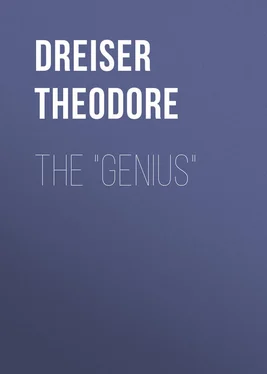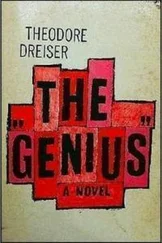Theodore Dreiser - The Genius
Здесь есть возможность читать онлайн «Theodore Dreiser - The Genius» — ознакомительный отрывок электронной книги совершенно бесплатно, а после прочтения отрывка купить полную версию. В некоторых случаях можно слушать аудио, скачать через торрент в формате fb2 и присутствует краткое содержание. Жанр: foreign_antique, foreign_prose, на английском языке. Описание произведения, (предисловие) а так же отзывы посетителей доступны на портале библиотеки ЛибКат.
- Название:The Genius
- Автор:
- Жанр:
- Год:неизвестен
- ISBN:нет данных
- Рейтинг книги:5 / 5. Голосов: 1
-
Избранное:Добавить в избранное
- Отзывы:
-
Ваша оценка:
- 100
- 1
- 2
- 3
- 4
- 5
The Genius: краткое содержание, описание и аннотация
Предлагаем к чтению аннотацию, описание, краткое содержание или предисловие (зависит от того, что написал сам автор книги «The Genius»). Если вы не нашли необходимую информацию о книге — напишите в комментариях, мы постараемся отыскать её.
The Genius — читать онлайн ознакомительный отрывок
Ниже представлен текст книги, разбитый по страницам. Система сохранения места последней прочитанной страницы, позволяет с удобством читать онлайн бесплатно книгу «The Genius», без необходимости каждый раз заново искать на чём Вы остановились. Поставьте закладку, и сможете в любой момент перейти на страницу, на которой закончили чтение.
Интервал:
Закладка:
He had saved some eight hundred dollars, which was in a savings bank and he withdrew three hundred for his little outing. He took Christina a very handsomely bound copy of Villon, of whom she was fond, and several volumes of new verse. Most of these, chosen according to his most recent mood, were sad in their poetic texture; they all preached the nothingness of life, its sadness, albeit the perfection of its beauty.
At this time Eugene had quite reached the conclusion that there was no hereafter – there was nothing save blind, dark force moving aimlessly – where formerly he had believed vaguely in a heaven and had speculated as to a possible hell. His reading had led him through some main roads and some odd by-paths of logic and philosophy. He was an omnivorous reader now and a fairly logical thinker. He had already tackled Spencer's "First Principles," which had literally torn him up by the roots and set him adrift and from that had gone back to Marcus Aurelius, Epictetus, Spinoza and Schopenhauer – men who ripped out all his private theories and made him wonder what life really was. He had walked the streets for a long time after reading some of these things, speculating on the play of forces, the decay of matter, the fact that thought-forms had no more stability than cloud-forms. Philosophies came and went, governments came and went, races arose and disappeared. He walked into the great natural history museum of New York once to discover enormous skeletons of prehistoric animals – things said to have lived two, three, five millions of years before his day and he marvelled at the forces which produced them, the indifference, apparently, with which they had been allowed to die. Nature seemed lavish of its types and utterly indifferent to the persistence of anything. He came to the conclusion that he was nothing, a mere shell, a sound, a leaf which had no general significance, and for the time being it almost broke his heart. It tended to smash his egotism, to tear away his intellectual pride. He wandered about dazed, hurt, moody, like a lost child. But he was thinking persistently.
Then came Darwin, Huxley, Tyndall, Lubbock – a whole string of British thinkers who fortified the original conclusions of the others, but showed him a beauty, a formality, a lavishness of form and idea in nature's methods which fairly transfixed him. He was still reading – poets, naturalists, essayists, but he was still gloomy. Life was nothing save dark forces moving aimlessly.
The manner in which he applied this thinking to his life was characteristic and individual. To think that beauty should blossom for a little while and disappear for ever seemed sad. To think that his life should endure but for seventy years and then be no more was terrible. He and Angela were chance acquaintances – chemical affinities – never to meet again in all time. He and Christina, he and Ruby – he and anyone – a few bright hours were all they could have together, and then would come the great silence, dissolution, and he would never be anymore. It hurt him to think of this, but it made him all the more eager to live, to be loved while he was here. If he could only have a lovely girl's arms to shut him in safely always!
It was while he was in this mood that he reached Florizel after a long night's ride, and Christina who was a good deal of a philosopher and thinker herself at times was quick to notice it. She was waiting at the depot with a dainty little trap of her own to take him for a drive.
The trap rolled out along the soft, yellow, dusty roads. The mountain dew was still in the earth though and the dust was heavy with damp and not flying. Green branches of trees hung low over them, charming vistas came into view at every turn. Eugene kissed her, for there was no one to see, twisting her head to kiss her lips at leisure.
"It's a blessed thing this horse is tame or we'd be in for some accident. What makes you so moody?" she said.
"I'm not moody – or am I? I've been thinking a lot of things of late – of you principally."
"Do I make you sad?"
"From one point of view, yes."
"And what is that, sir?" she asked with an assumption of severity.
"You are so beautiful, so wonderful, and life is so short."
"You have only fifty years to love me in," she laughed, calculating his age. "Oh, Eugene, what a boy you are! – Wait a minute," she added after a pause, drawing the horse to a stop under some trees. "Hold these," she said, offering him the reins. He took them and she put her arms about his neck. "Now, you silly," she exclaimed, "I love you, love you, love you! There was never anyone quite like you. Will that help you?" she smiled into his eyes.
"Yes," he answered, "but it isn't enough. Seventy years isn't enough. Eternity isn't enough of life as it is now."
"As it is now," she echoed and then took the reins, for she felt what he felt, the need of persistent youth and persistent beauty to keep it as it should be, and these things would not stay.
CHAPTER XXIV
The days spent in the mountains were seventeen exactly, and during that time with Christina, Eugene reached a curious exaltation of spirit different from anything he had experienced before. In the first place he had never known a girl like Christina, so beautiful, so perfect physically, so incisive mentally, so full of a fine artistic perception. She was so quick to perceive exactly what he meant. She was so suggestive to him in her own thoughts and feelings. The mysteries of life employed her mind quite as fully as they did his. She thought much of the subtlety of the human body, of its mysterious emotions, of its conscious and subconscious activities and relationships. The passions, the desires, the necessities of life, were as a fine tapestry for her mind to contemplate. She had no time to sit down and formulate her thoughts; she did not want to write – but she worked out through her emotions and through her singing the beautiful and pathetic things she felt. And she could talk in a fine, poetic melancholy vein on occasion, though there was so much courage and strength in her young blood that she was not afraid of any phase of life or what nature might do with the little substance which she called herself, when it should dissolve. "Time and change happeneth to us all," she would quote to Eugene and he would gravely nod his head.
The hotel where he stopped was more pretentious than any he had been previously acquainted with. He had never had so much money in his life before, nor had he ever felt called upon to spend it lavishly. The room he took was – because of what Christina might think – one of the best. He took Christina's suggestion and invited her, her mother and her brother to dinner on several occasions; the remainder of the family had not arrived yet. In return he was invited to breakfast, to lunch and dinner at the bungalow.
Christina showed on his arrival that she had planned to be with him alone as much as possible, for she suggested that they make expeditions to High Hill, to Bold Face, and The Chimney – three surrounding mountains. She knew of good hotels at seven, ten, fifteen miles distance to which they could go by train, or else they drive and return by moonlight. She had selected two or three secluded spots in thickets and groves where the trees gave way to little open spaces of grass, and in these they would string a hammock, scatter their books of verse about and sit down to enjoy the delights of talk and love-making.
Under the influence of this companionship, under cloudless skies and in the heart of the June weather, Christina finally yielded to an arrangement which brought Eugene into a relationship which he had never dreamed possible with her. They had progressed by degrees through all the subtleties of courtship. They had come to discuss the nature of passion and emotion, and had swept aside as negligible the conviction that there was any inherent evil in the most intimate relationship. At last Christina said frankly:
Читать дальшеИнтервал:
Закладка:
Похожие книги на «The Genius»
Представляем Вашему вниманию похожие книги на «The Genius» списком для выбора. Мы отобрали схожую по названию и смыслу литературу в надежде предоставить читателям больше вариантов отыскать новые, интересные, ещё непрочитанные произведения.
Обсуждение, отзывы о книге «The Genius» и просто собственные мнения читателей. Оставьте ваши комментарии, напишите, что Вы думаете о произведении, его смысле или главных героях. Укажите что конкретно понравилось, а что нет, и почему Вы так считаете.








